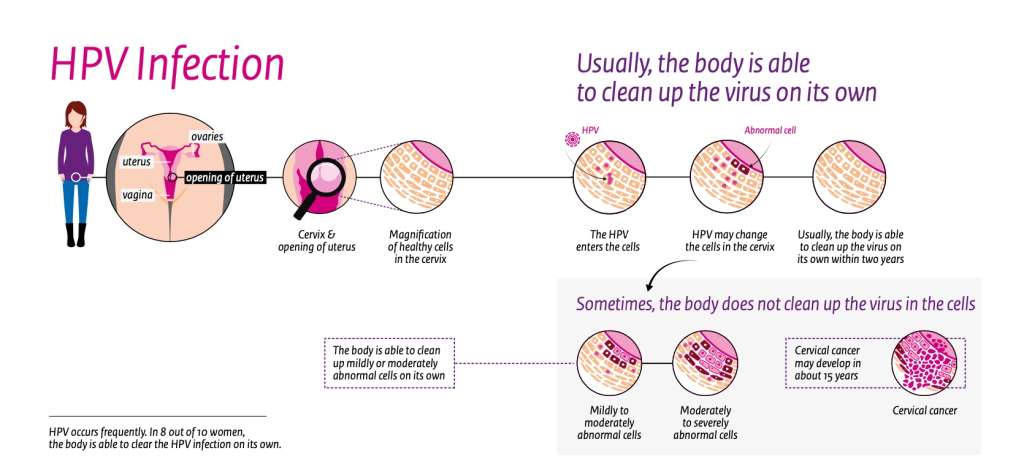Cervical cancer is one of the most preventable and treatable forms of cancer, as long as it is detected early and managed effectively. The purpose of our cervical cancer screening program is to prevent cervical cancer in Curaçao by early detection of a pre-cancer condition.
Every year, many women get cervical cancer worldwide, and to this date women in Curaçao often die from this disease. In Curaçao, Cervical cancer occurs most frequently in women between 25 and 65 years of age. That is why we invite these women for this screening.
The screening is used to test women for the risk of having cervical cancer. Early detection can prevent cervical cancer. Women who participate in the screening have a reduced risk of cervical cancer.
What causes cervical cancer?
Cervical cancer is caused by a long-lasting infection with a virus: the human papilloma virus (HPV).
HPV occurs frequently. Nearly everyone gets HPV at one point in time. The body is nearly always able to clean up the virus on its own. Sometimes, it does not succeed in this. For example, if the body’s resistance is low. This may be caused, among other things, by taking specific medicinal products and smoking.
If the body fails to clean up the virus, the cells in the cervix may change. Abnormal cells may change in a preliminary stage of cervical cancer.
This is not cancer and can be treated well. The treatment prevents it from developing into cancer.
The first stage sometimes develops into cervical cancer. This is a very slow process. It usually takes at least 15 years.

www.rivm.nl
What happens during the screening?
One of our skilled Nurse Practitioners will ask you a few questions. Next, you undress from the waist down.
The nurse uses a special instrument for the test: the speculum. She gently slides the speculum into your vagina. With a small brush, she samples cells from the cervix. She puts them into a pot, which she sends to the lab. The testis called a smear test and typically lasts about 10 minutes.
The smear test will be tested for HPV in the lab. If this virus is present, the lab technician will also establish immediately whether the smear test contains abnormal cells. The result of this cell analysis will determine whether further examination at the gynaecologist is necessary.
What to avoid at your screening
When you come in for your smear test appointment make sure you:
- have your insurance (SVB) card and ID with you
- are not having your period. Reschedule your appointment if you are menstruating
- have not had sexual intercourse for 72 hours before your cervical screening appointment; Semen could interfere with your test results.
What can the results be?
About three weeks after the screening, you will receive notice from your general practitioner (Huisarts) with the results. If you don’t hear from your doctor, make sure to contact him/her yourself, because knowing your result is empowering yourself to take prevention in to your own hands. You can get the following test results:
No HPVYou do not have an increased risk of cervical cancer. Further testing is not necessary. You may participate in the screening again in the next round of invitations.
91 out of 100 women get this result.
HPV detected, no abnormal cells
You will receive another invitation for a smear test at the family doctor after six months. We then check once again to ensure that no abnormal cells are present.
5 out of 100 women get this result.
HPV and abnormal cells detected
Further examination by a gynae- cologist is necessary. He/She will decide whether treatment is necessary.
2 out of 100 women get this result
Unclear
A new smear test is required. Please make an appointment with your family doctor for this in about six weeks after your first smear test.
In 2 out of 100 women, the smear test is inconclusive.
Taking prevention into your own hands
Every year, there are new cases of women in the Curaçao who learn they have cervical cancer and unfortunately, women still die from the disease. Thanks to screening, the preliminary stages of cervical cancer can be detected early. In most cases, a preliminary stage of cervical cancer can be successfully treated. Treatment can prevent the development of cervical cancer. A population that diligently screens, can effectively stop cervical cancer altogether.
More Questions?
Do you have questions about your invitation, how the screening works, or other practical matters? Please contact our Caribbean Prevention Center at 0800-1811, Whatsapp us or fill out our contact form.



